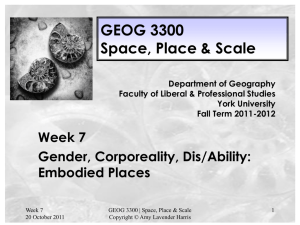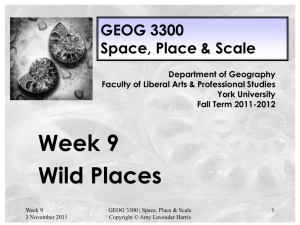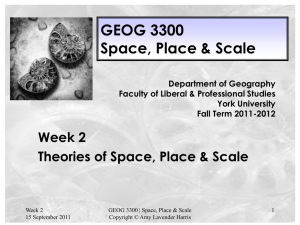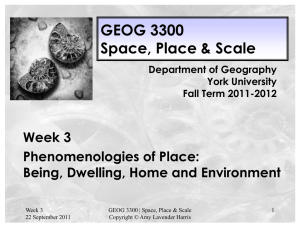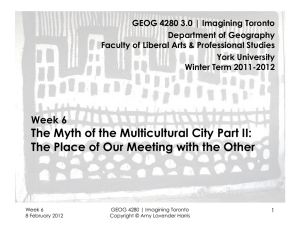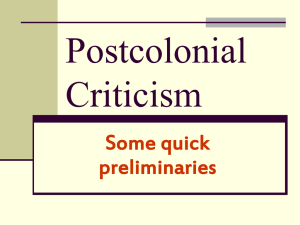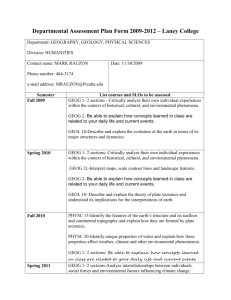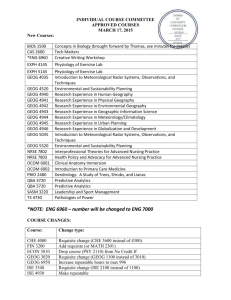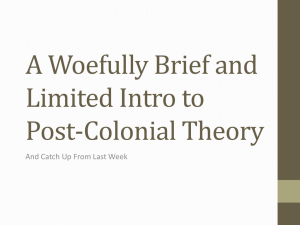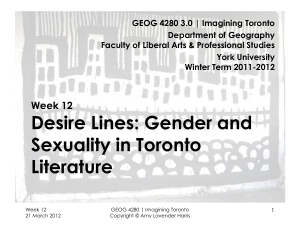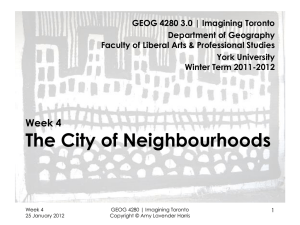GEOG 3300 Week 4 Postcolonial Geographies lecture slides 2011
advertisement
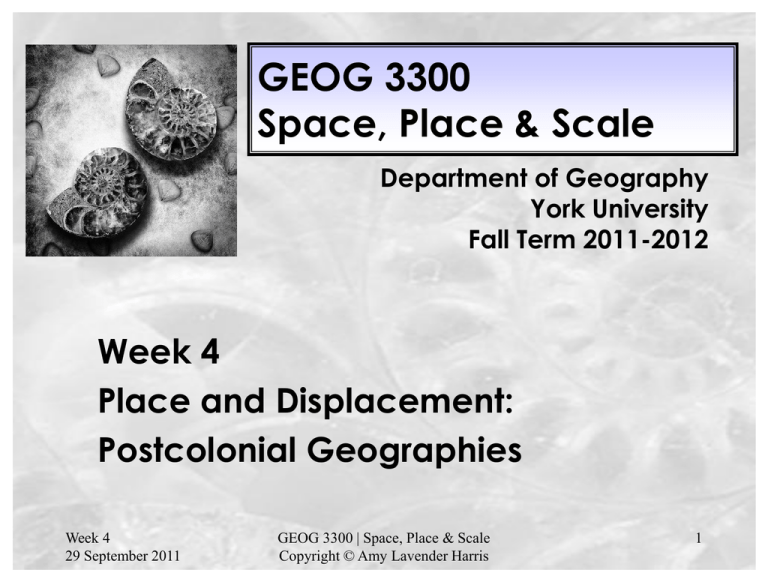
GEOG 3300 Space, Place & Scale Department of Geography York University Fall Term 2011-2012 Week 4 Place and Displacement: Postcolonial Geographies Week 4 29 September 2011 GEOG 3300 | Space, Place & Scale Copyright © Amy Lavender Harris 1 Approach Descriptive Phenomenological Social Constructionist Week 4 29 September 2011 Associated Schools Preoccupations with Place -Regional Geography (Richard Hartshorne) -Early cultural geographers (Carl Sauer) -Spatial Science (1970s) -‘ideographic’ -‘chorology’ -Regions and cultures -Place as a thing: ontologically given -Environmental determinism (although Sauer held that culture transforms nature) -‘Place’ remains largely undefined Phenomenology (Heidegger, MerleauPonty, Bachelard) -Humanistic geographers (Yi-Fu Tuan, Anne Buttimer, David Seamon, Ted Relph, Edward Casey) -experienced, ‘embodied’ or lived place --’topophilia’ (Tuan) -Home and dwelling -belonging and attachment -‘authenticity’ Place as primordial or Place as “mutually constituted” by environment and culture -‘romantic’? Naïve? -‘Radical’ Geography -Marxism (David Harvey -Feminism (Gillian Rose, Doreen Massey) -Poststructuralism and postcolonialism (Edward Soja, Homi Bhabha, Edward Said) -Social determinism: places as socially constructed -Spatial ‘turn’ in the cultural and social sciences -Class, gender and race -Transgression and resistance; power and privilege -Postcolonial legacies -‘ungrounded? Incoherent? -What happens to ontology? GEOG 3300 | Space, Place & Scale Copyright © Amy Lavender Harris 2 Colonialism • Colonialism and imperialism: – The process of expanding and controlling political territory: empire-building. – European colonial period: 15th-20th century (Portugal, Spain, England, Netherlands, France, Germany, Belgium). – Colonial motivations: territory claiming, resource exploitation, economic expansion, cultural subjugation and/or religious conversion. – Settler vs exploitation colonialism. – Colonial effects: slavery, genocide, war, cultural exchange, economic expansion, technological advances. • Decolonization: process of former colonies (re)gaining independence [India, 1947; Senegal, 1960; Namibia, 1990] • Neocolonialism (GATT, NAFTA, CAFTA; corporate multinationalism) Week 4 29 September 2011 GEOG 3300 | Space, Place & Scale Copyright © Amy Lavender Harris 3 Postcolonialism • Postcolonialism: idea that legacies of colonialism persist long after former colonies have gained independence • Postcolonial scholars & writers respond to what they call the ‘logic of colonialism’ • Legacies: in politics, economic relations, culture (especially literature, art, film), language, identity, international relations • Postolonial scholars: Frantz Fanon (Black Skin, White Masks, 1952), Edward Said (Orientalism, 1978), Gayatri Spivak, “Can the Subaltern Speak?,” Homi Bhabha (The Location of Culture, 1994) • Postcolonial discourse: power and knowledge, literary studies • Subaltern: those outside the post/colonial power structures; oppositional voices • Idea that colonizers need colonial ‘Others’ to reinforce their own sense of identity Week 4 29 September 2011 GEOG 3300 | Space, Place & Scale Copyright © Amy Lavender Harris 4 The Challenge of Postcolonial Thought • • • • Spivak’s problem: “Can the Subaltern speak?” Representing heterogeneity (Said vs. Bhabha) Bell hooks: “marginality as a Site of Resistance” Fanon on violence (ref: Algeria, Martinique) Week 4 29 September 2011 GEOG 3300 | Space, Place & Scale Copyright © Amy Lavender Harris 5 Postcolonial Challenges • • • • • • • • Cultural identity; identity politics New dualisms: ‘the West’ vs Islam, the ‘East’, the Orient, etc. Race and racism Power and knowledge In literature, the idea of mimicry Hybridity and “third space” as consolation? How fluid are the boundaries between colonizer and colonized? Globalization: is contemporary economic globalization a new form of colonialism? • Is geography postcolonial? How do such perspectives influence our understandings of space and place? How might the centre be shifted? • Is Toronto a postcolonial city? Week 4 29 September 2011 GEOG 3300 | Space, Place & Scale Copyright © Amy Lavender Harris 6 No History of Colonialism in Canada? "We are one of the most stable regimes in history. ... We are unique in that regard … We also have no history of colonialism. So we have all of the things that many people admire about the great powers but none of the things that threaten or bother them.“ [Canadian Prime Minister Stephen Harper on Canada, comment made at 2009 G20 Summit in Pittsburgh. Source: http://www.reuters.com/article/GCAG20Pittsburgh/idUSTRE58P05Z20090926] Week 4 29 September 2011 GEOG 3300 | Space, Place & Scale Copyright © Amy Lavender Harris 7 The ‘Door of No Return’ • Ile de Goree / Goree Island, off the coast of Senegal • One (of many) slave transport sites on the west cost of Africa • House of Slaves / Maison des esclaves Week 4 29 September 2011 GEOG 3300 | Space, Place & Scale Copyright © Amy Lavender Harris 8 http://en.wikipedia.org/wiki/File:Portal_of_sorrow-senegal-01.jpg Week 4 29 October 2011 GEOG 3300 | Space, Place & Scale Copyright © Amy Lavender Harris 9 Brand’s Map to the Door of No Return • Goree Island and the House of Slaves: the Door of No Return. • Entire cultures reduced to fragments, impressions, myths, colonial naratives (imposed) • The loss of an entire history stolen, ruptured, ripped away • Place as purely fictional: “I am constructing a map of the region, paying attention to faces, to the unknowable, to unintended acts of returning, to impressions of doorways.” (Brand, 19) • The Door as a fiction Week 4 29 October 2011 GEOG 3300 | Space, Place & Scale Copyright © Amy Lavender Harris 10 The Map that Roared • Matthew Sparke on The ‘map that roared’: critical cartographies and postcolonial interpretations of place • Sparke describes a native land claim trial and The Historical Atlas of Canada as “cartographic negotiations of the meanings of space, territory, and state jurisdiction.” • Hegemonic and counterhegemonic tensions: relations of power are inherent in all places and in all acts of placemaking • Postcolonial theory and colonial legacies • Derrida (indirectly), Edward Said, Homi Bhabha Week 4 29 October 2011 GEOG 3300 | Space, Place & Scale Copyright © Amy Lavender Harris 11
